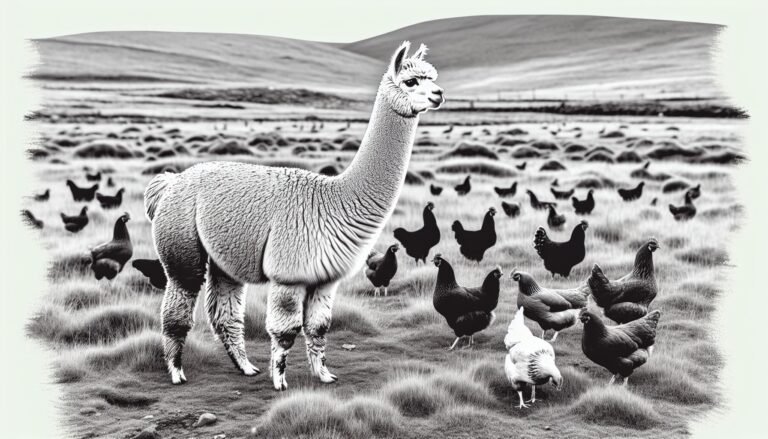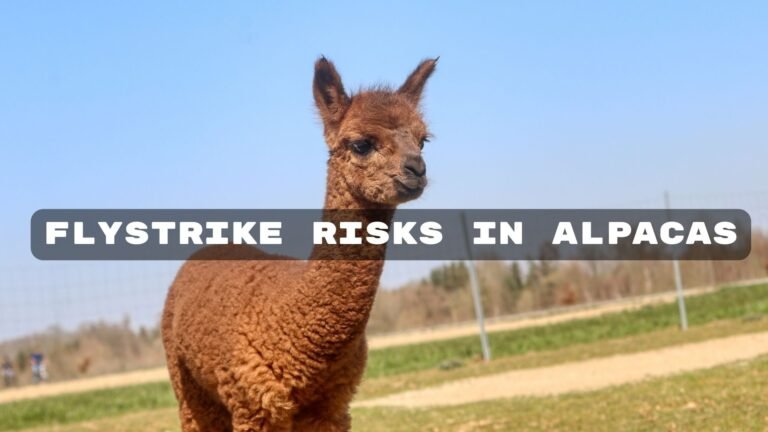Why Process Alpaca Fiber on Small Farms?
You’ll get higher-quality fiber by processing alpaca fiber on small farms because you can carefully handle and sort the fleece yourself. This hands-on approach guarantees cleaner, finer fiber and supports sustainable, eco-friendly practices by reducing transportation and waste. You also get to build stronger community ties through direct sales and workshops. Plus, small-scale processing lets you craft unique, artisanal products that reflect local heritage. There’s much more to discover about its benefits and opportunities.
Key Takeaways
- Small-scale processing ensures high-quality, unique alpaca products tailored to specific farm standards.
- Local fiber processing reduces transportation costs and environmental impact.
- Hands-on care improves fiber cleanliness, staple length, and overall quality.
- Small farms foster community connections through workshops, tours, and direct sales.
- Creative opportunities arise by blending fibers and using natural dyes for bespoke products.
Benefits of Small-Scale Fiber Processing

The advantage of small-scale fiber processing lies in the control it gives you over the quality and uniqueness of your alpaca products. By handling alpaca fiber processing on-site, you can closely monitor each step, ensuring your fiber meets the highest standards. This direct involvement reduces transportation costs and delays, making the entire operation more efficient. Plus, small-scale processing sparks creativity, letting you craft distinctive, handcrafted items that stand out in niche markets and fetch better prices. It also allows you to connect with your community by sharing sustainable farming practices. Beyond selling finished products, you can diversify income through workshops or classes, turning your farm into a hub for fiber arts. Small-scale alpaca fiber processing truly offers both economic and artistic benefits you won’t want to miss.
Enhancing Fiber Quality Through Hands-On Care
Taking charge of fiber processing on your small farm means you can give each alpaca’s fiber the hands-on care it deserves. You’ll be able to meticulously skirt the fiber, removing impurities that would otherwise lower its quality. Using traditional methods like the Inca Esquila, you prioritize both ethical treatment and improved fiber yield. This individual attention lets you monitor staple length and cleanliness closely, directly enhancing alpaca fiber quality. Tailoring feeding and management strategies further supports finer micron counts, boosting marketability. Plus, by personally handling the fiber, you can produce unique products that align with your specific breeding goals, whether that’s particular colors or textures. This hands-on approach guarantees your alpaca fiber stands out in niche markets, reflecting your commitment to quality.
Sustainable Practices in Small Farm Fiber Production
Although alpacas need less feed than traditional livestock, their fiber offers a sustainable advantage for small farms aiming to optimize land and resources. When you engage in alpaca fiber processing, you’re not only supporting efficient land use but also promoting ethical treatment by shearing alpacas annually to prevent heat stress. Their fiber is six times warmer than sheep’s wool, biodegradable, and renewable, making it an environmentally friendly choice. Processing alpaca fiber locally helps you reduce transportation emissions, preserving rural landscapes and agricultural traditions. By handling fiber processing on-site, you create value-added products that appeal to consumers who care about sustainability. This hands-on approach makes your small farm a model of responsible, eco-conscious fiber production.
Connecting Producers and Consumers Locally

Connecting producers and consumers locally creates a unique bond that lets you see the story behind each alpaca fiber product. When small farms handle fiber production on-site, you get to appreciate the craftsmanship and care invested in every step. This direct connection means you can learn about the warmth, softness, and natural color variations unique to alpaca fiber from that specific farm. It also guarantees that the products you buy meet high-quality and ethical standards since farms control the entire process. Plus, supporting local fiber production boosts community economies by creating jobs and promoting sustainable agriculture. Many farms offer workshops or tours, giving you a chance to deepen your understanding of alpaca fiber and sustainable farming, making your purchase truly meaningful.
Preserving Traditional Fiber Processing Techniques
When you support local alpaca fiber production, you’re also helping preserve the traditional techniques that give these fibers their unique character. Small farms focus on artisanal craftsmanship, combining age-old methods with careful, hands-on processing. This approach keeps cultural heritage alive and guarantees quality. Here’s how alpaca fiber processing on small farms preserves traditions:
- Farmers use centuries-old shearing and spinning methods that honor historical practices.
- Local processing allows you to connect with the story behind each fiber, fostering appreciation for the craft.
- Ethical care of alpacas is maintained by networks like Pacomarca, blending tradition with modern animal welfare.
Economic Opportunities for Small Fiber Farms
You can boost your farm’s income by turning alpaca fiber into finished products like yarn, which often sells for much more than raw fiber. Offering hands-on workshops lets you connect directly with customers while sharing your craft. Plus, selling your fiber and products straight to buyers cuts costs and builds a loyal local market.
Diversifying Farm Income
Although raising alpacas is rewarding, processing their fiber on-site can considerably boost your farm’s income by turning raw fleece into higher-value products like yarn and rovings. Alpaca fiber processing opens doors to diversify your revenue streams and strengthen your farm’s financial health. Here’s how you can benefit:
- Sell value-added products such as yarn and specialty items, which fetch higher prices than raw fiber.
- Build a loyal customer base that values handmade, locally produced goods, encouraging repeat business.
- Tap into niche markets focused on sustainable, ethically sourced materials, enhancing your farm’s reputation.
Hands-On Educational Experiences
Since small fiber farms like Clover Brooke Farm offer hands-on educational experiences, you can engage visitors in every step of fiber processing—from shearing to spinning and dyeing—deepening their appreciation for sustainable practices. By hosting workshops and farm tours focused on alpaca fiber, you not only diversify your income but also build personal connections with consumers who value transparency. These programs preserve traditional fiber arts while raising awareness of sustainable agriculture. Plus, agritourism brings visitors from various regions, boosting local economies. Engaging children through specialized camps introduces a new generation to fiber arts, securing the future of these traditions. Offering hands-on experiences with alpaca fiber lets you create meaningful economic opportunities while fostering community support for small fiber farms.
Direct Market Fiber Sales
When small fiber farms sell alpaca fiber directly to consumers, they not only keep more of the profits but also create personal connections with buyers who appreciate sustainable, local products. This direct market approach lets you capitalize on growing demand for unique, high-quality alpaca fiber items and charge premium prices. You can also reduce costs by processing fiber on-site, avoiding extra transportation and processing fees. Here are key benefits:
- Build loyal customer relationships by sharing your farm’s story and sustainable practices.
- Diversify income through workshops and agritourism, boosting fiber sales and education.
- Appeal to consumers who value local, artisan products, strengthening your market position.
Direct sales empower you to maximize profits while promoting eco-friendly, small-scale alpaca fiber production.
Customization and Artisanal Product Development

You can create unique fiber blends that stand out from mass-produced options by experimenting with different colors and textures. Handcrafted dye techniques let you add a personal touch, making each product truly one-of-a-kind. Limited edition creations not only showcase your skill but also attract customers looking for exclusive, artisanal items.
Unique Fiber Blends
Although many fiber producers focus on single-material products, small farms have the unique opportunity to craft customized blends by combining alpaca fiber with wool, silk, or other materials. This lets you create distinctive yarns that truly stand out. Here’s why unique fiber blends matter:
- Tailored Textures and Colors: By blending alpaca fiber with other fibers, you can achieve textures and hues that cater to specific consumer tastes.
- Niche Market Appeal: Customized blends fit luxury fashion or sustainable textiles, boosting your product’s desirability and value.
- Eco-Friendly Variety: Using alpaca’s 21 natural colors means you can offer eco-conscious, naturally dyed or undyed options that attract environmentally aware buyers.
These artisanal blends help you connect with customers seeking one-of-a-kind, quality products crafted with care on small farms.
Handcrafted Dye Techniques
Building on the appeal of unique fiber blends, handcrafted dye techniques take customization a step further by letting you create one-of-a-kind colors for your alpaca products. Using natural dyes from plants, minerals, and insects, you can enhance the natural beauty of alpaca fleece’s 21 color varieties with rich, eco-friendly hues. Immersion dyeing lets you control saturation and blending, giving your fiber a distinct look that stands out in the market. These artisanal methods not only support sustainable farming but also align with growing consumer demand for ethically produced goods. Plus, by sharing your dyeing process through workshops, you engage customers and deepen their appreciation for traditional craftsmanship and fiber arts, turning your alpaca fleece into truly personalized creations.
Limited Edition Creations
When small farms process their own alpaca fiber, they can create limited edition products that showcase local artistry and craftsmanship. This gives you the chance to offer unique items that stand out in niche markets. By controlling the entire process, you can customize products to meet specific tastes and trends. Here’s why limited edition creations are valuable:
- You can use the 21 natural shades of alpaca fiber to craft artisanal products that appeal to diverse consumer preferences.
- Personalized yarns or bespoke garments allow you to charge premium prices and build loyal customers.
- Sharing the story of your local, sustainable production enhances your brand identity and marketing.
Processing alpaca fiber yourself means you’re not just selling a product—you’re offering a piece of art.
Environmental Impact of Localized Fiber Processing
Since you’re processing alpaca fiber right on your farm, you cut down on the carbon emissions linked to shipping raw materials long distances. This localized fiber processing considerably reduces your farm’s carbon footprint and greenhouse gas emissions. Plus, you gain better control over sustainable practices by choosing eco-friendly detergents and minimizing water use during washing. Processing fiber on-site also means less waste—you can repurpose unusable fiber as mulch or insulation, making your operations more efficient. By keeping fiber processing local, you not only support your farm’s environmental stewardship but also help preserve biodiversity and traditional fiber arts often lost in large-scale industrial settings. This approach encourages sustainable agriculture while strengthening your community’s economy and promoting greener choices.
Education and Community Engagement on Fiber Farms
You can get hands-on experience at fiber farms, learning how raw alpaca fiber turns into beautiful, usable products. These workshops don’t just teach skills—they help build strong local communities around fiber arts. By joining in, you’re supporting sustainable farming practices and connecting with others who share your passion.
Hands-on Learning Experiences
Although alpaca fiber processing might seem complex, fiber farms like Clover Brooke Farm make it accessible by offering hands-on experiences where you can try shearing, cleaning, spinning, and dyeing. These activities help you truly appreciate the unique qualities of alpaca fiber, which is six times warmer than sheep’s wool and naturally moisture-wicking. When you visit, you can expect to:
- Participate in workshops that teach fiber processing techniques and highlight alpaca’s sustainable benefits.
- Engage in family-friendly events like the Spring Farm Tour and Summer Adventure Camp that combine fun with learning.
- Discover the cultural and historical importance of alpacas while supporting local farming practices.
Building Local Fiber Communities
Countless fiber farms like Clover Brooke Farm are dedicated to building strong local fiber communities by offering hands-on workshops that teach sustainable fiber production—from shearing to dyeing. When you participate, you get to see firsthand how fiber animals like alpacas are cared for and how their fiber is transformed into beautiful textiles. These farms also host events like Spring Farm Tours and Summer Adventure Camps, which connect families and individuals to the agricultural roots of fiber arts. By engaging directly with local producers, you not only learn about sustainable practices but also support small-scale artisans who preserve these traditions. Building this community fosters a loyal customer base that values quality and sustainability, strengthening local economies and keeping fiber arts alive for future generations.
Challenges and Solutions in Small Farm Fiber Processing
When small farms want to process alpaca fiber efficiently, they often face hurdles like limited access to large-scale facilities and the high costs of washing, carding, and spinning. In fiber farming, overcoming these challenges is key to success. You can tackle them by:
- Investing in small-scale equipment or partnering with local artisans to share processing resources.
- Implementing strict quality control and skirting to manage inconsistent fiber quality before milling.
- Expanding marketing efforts through agritourism and community engagement to boost brand recognition.
Additionally, joining educational workshops and organizations like the International Alpaca Association can provide valuable support. By addressing these issues strategically, you’ll streamline fiber processing and strengthen your small farm’s sustainability.
Frequently Asked Questions
What Is the Purpose of Alpacas on a Farm?
Imagine fluffy clouds grazing peacefully—that’s your alpaca companionship on the farm. You’ll enjoy gentle animals that offer warmth through their fiber and calm presence, creating a cozy, productive atmosphere for your small farm life.
What Are the Benefits of Alpaca Fibre?
You’ll appreciate alpaca fiber’s softness, warmth, and hypoallergenic qualities. Plus, it supports sustainable practices by being eco-friendly and durable, making it a smart, comfortable choice for clothing that’s kind to both you and the planet.
Do Alpaca Farmers Make Money?
You’re sitting on a gold mine with alpaca farming—Profitability Insights show selling fiber, yarn, and farm experiences can boost income. With smart management, you’ll turn raw fiber into cash, diversifying your revenue streams effectively.
What Are the Disadvantages of Alpaca Wool?
When you handle alpaca processing, you’ll find alpaca wool’s higher cost, sensitivity to humidity, and lack of natural lanolin challenging. It’s softer but prone to pilling, and limited colors can affect your product’s appeal.








Our picks
Alpaca & Wool Felted Sole Inserts: Comfy Upgrade?
Best Alpaca Socks for Hiking: Ultimate Comfort and Durability on Trails
Best Alpaca Halter for Comfort and Control